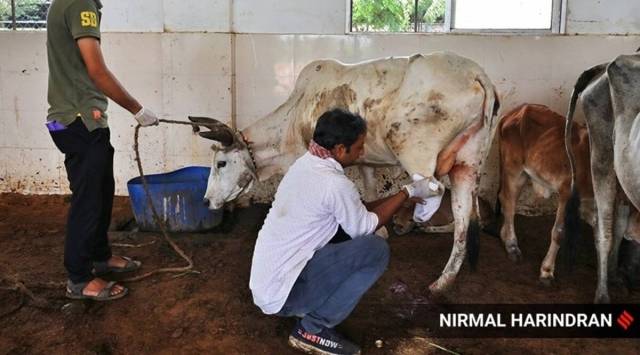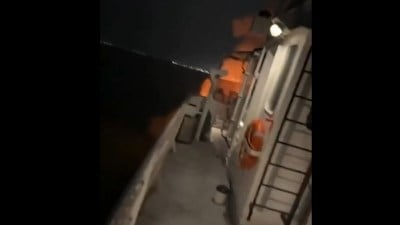Lumpy skin disease: Maharashtra steps up vaccination, urges livestock farmers not to panic
A total of 4,78,442 livestock animals in 1,566 villages have been vaccinated. Out of the 2,387 infected animals in affected villages, 1,435 have recovered after treatment.
 Out of the 2,387 infected animals in affected villages, 1,435 have recovered after treatment. (Express photo/File)
Out of the 2,387 infected animals in affected villages, 1,435 have recovered after treatment. (Express photo/File)As the lumpy skin disease spreads rapidly among cattle in Maharashtra, state animal husbandry commissioner Sachindra Pratap Singh has said that funds to the tune of Rs 1 crore should be made available for each district from the district planning committee for procurement of vaccines and medicines.
Around 10 lakh vaccine doses have been received for the control of lumpy skin disease, of which 1.25 lakh doses were distributed, Singh said. He also appealed to livestock farmers not to panic and cautioned private practitioners against prescribing expensive antibiotics and other supportive medicines for the LSD-ailing animals. “All necessary medicines required for the LSD treatment protocol are available with government veterinary dispensaries and taluka mini veterinary polyclinics,” he said.
A total of 4,78,442 livestock animals in 1,566 villages have been vaccinated. Out of the 2,387 infected animals in affected villages, 1,435 have recovered after treatment. The rest of the affected livestock are being treated, officials at the animal husbandry department told The Indian Express.
Minister of animal husbandry Radhakrishna Vikhe Patil, along with animal husbandry commissioner, Sachindra Pratap Singh, visited the villages affected by the LSD in Jalgaon, Akola and Aurangabad districts on September 8 and reviewed the current situation by personally meeting the farmers and field officers.
“Lumpy skin disease is spreading rapidly in the state. To prevent the spread, authorities should raise public awareness on a large scale. Social media platforms should also be used for public awareness. Vaccination campaigns should be conducted in collaboration with private livestock supervisors to control the LSD. The disease is curable if treated promptly and the mortality rate of livestock from this disease is very low, so livestock farmers should not panic,” Singh said .
“Farmers have been urged to contact toll free number 1800-2330-418 or state level call center toll free number 1962 of animal husbandry department,” Singh said.
The state of Maharashtra has been declared as a ‘controlled area’ with respect to the LSD. As per a government notification, the movement, market, races, animal fairs, exhibitions of cattle and buffalo species within the controlled area or any other place outside the area is prohibited.
The LSD is a viral disease of cattle and buffaloes and is currently endemic in Rajasthan, Gujarat, Punjab, Haryana, Himachal Pradesh, Uttarakhand, Jammu Kashmir, Uttar Pradesh, Madhya Pradesh, Goa and Andhra Pradesh. So far due to this disease 70,181 livestock animals have died till September 9 in India – 45,063 in Rajasthan, 16,866 in Punjab, 5,344 in Gujarat and 1,810 in Haryana.
The first incidence in Maharashtra was reported on August 4 in village Chinawal of Raver taluka of Jalgaon district. The spread has been noticed in 280 villages of Jalgaon, Ahmednagar, Akola, Dhule, Pune, Latur, Aurangabad, Beed, Satara, Buldana, Amravati, Osmanabad, Kolhapur, Sangli, Yeotmal, Parbhani, Solapur, Washim, Nashik and Jalna. A total of 42 infected animals have died – 17 in Jalgaon district, 13 in Ahmednagar, 1 in Dhule, 1 in Akola, 3 in Pune, 3 in Buldhana, 3 in Amravati and 1 in Washim.
In the year 2020-21, outbreaks were found in 26 districts of the state but the mortality was very low. Also in 2021-22, an outbreak was detected in 10 districts but there was no mortality. In order to keep down the mortality rate due to the disease, a batch of 10 lakh vaccine doses has been received to vaccinate cows within a radius of 5 km of the affected area across the state. However, instructions were given that vaccination should be done at a faster pace and continuous efforts should be made to bring the disease under complete control.
Instructions to fill up vacant posts
“There are almost 250 vacant posts of Class 1 livestock development officers and around 500 posts of para veterinarians have to be filled. We have released the advertisement and these will soon be filled,” officials said.
For the vaccination drive planned on mission mode, instructions have been issued to avail of help from across six veterinary colleges and private veterinarians.








